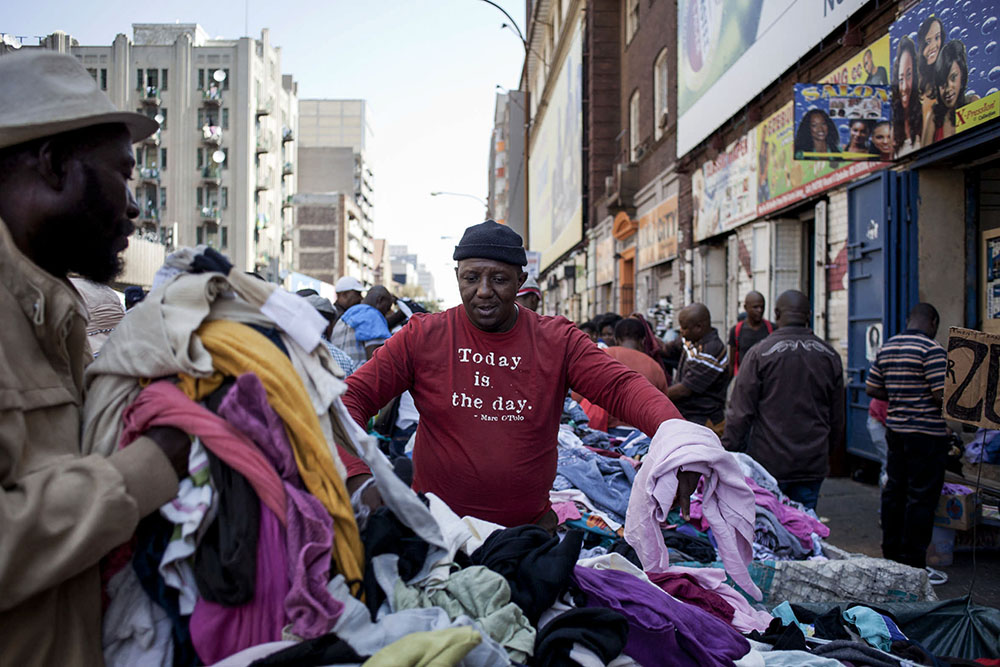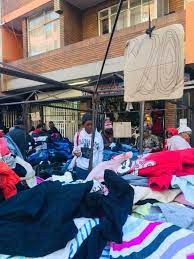For decades, Dunusa Street Market on De Villiers Street in Johannesburg’s inner city symbolised resilience, creativity, and survival. The market’s rows of second-hand clothing stalls captured the spirit of township hustle and entrepreneurship. It was more than a shopping spot — it was a lifeline for thousands of vendors and bargain hunters.
Thank you for reading this post, don't forget to subscribe!Now that lifeline is gone. The colourful stalls have disappeared, replaced by rows of parked taxis. For many vendors, this closure marks the end of an era.
A Market That Defined Johannesburg’s Hustle
Dunusa sat near the busy Noord Taxi Rank, a central point that attracted workers, students, and resellers from across Gauteng. Shoppers loved its variety — from jeans and jackets to handbags and sneakers.
The market’s nickname, “Dunusa,” comes from a Zulu word meaning to bend down. Shoppers often crouched to dig through piles of second-hand clothes spread on the ground. That image became part of Johannesburg’s identity — a mix of hustle, affordability, and style.
In a city where unemployment remains high, Dunusa gave people hope. It offered an entry point for small entrepreneurs to learn, trade, and build customer relationships.
From Bustling Market to Taxi Parking Bay
In recent weeks, visitors found an empty space where the market once stood. The city cleared out the traders and turned the area into a taxi parking zone.
Many vendors say they never received clear notice. Some heard that the city wanted to ease traffic and create safer taxi facilities. Others felt blindsided. Either way, hundreds lost their income overnight.
One former vendor told GroundUp, “We built our lives here. Every day we woke up early to sell clothes and feed our families. Now it’s gone — just like that.”

What Made Dunusa Special?
Dunusa was more than piles of thrifted clothes. It carried the heartbeat of urban culture.
- Affordable Fashion: Shoppers could find jackets, jeans, sneakers, and handbags at prices that fit tight budgets. Many items came from thrift exporters in Europe and the U.S., bringing global brands to local streets.
- Entrepreneurial Energy: The market helped new traders start small businesses without paying high rent. Many built loyal customer bases and advertised through WhatsApp and Facebook.
- Community Connection: Vendors supported one another, shared meals, and celebrated each other’s wins. Dunusa felt like family — not just business.
The closure didn’t only remove stalls; it broke up a close-knit community.
Urban Renewal vs. Informal Trade
The Dunusa shutdown highlights a growing clash between city renewal projects and informal traders. Johannesburg’s CBD has long depended on the informal economy. Yet, redevelopment often pushes traders aside without giving them alternative spaces.
The South African Informal Traders Alliance (SAITA) estimates that informal trading contributes billions to the national economy and supports millions of livelihoods. Despite this, traders still face evictions, harassment, and limited legal recognition.
Cities like Johannesburg need policies that combine urban order with economic inclusion. Without that balance, more markets like Dunusa could disappear — along with vital income sources for families.
Voices from the Ground
Former customers and traders expressed sadness online.
“That place helped me survive during COVID. I sold second-hand clothes there when jobs were scarce.” — Facebook post on Johannesburg CBD Updates
“Dunusa was the heart of Joburg’s hustle. You could always find a bargain and a smile.” — X (Twitter) post by @Joburg_Hustle
These voices reveal how much Dunusa meant to the city’s working class. The market gave traders pride and purpose, not just profit.
Where Can Traders Go Now?
The city has not announced any relocation plan. Some vendors have moved to pavements near Noord, while others have stopped trading entirely.
Experts recommend that the city create designated trading zones where vendors can operate safely and legally. Cities like Durban have already done this at Warwick Market. Cape Town has also introduced regulated informal trading spaces that remain lively and safe.
Without similar efforts, many of Johannesburg’s street traders will continue to work under uncertain and risky conditions.
Read more: Thrift & Vintage Stores in Joburg — Bargains This Month
The Legacy of Dunusa
Dunusa’s closure ends a vital chapter in Johannesburg’s informal economy, but its legacy will live on. Many traders who started there went on to open boutiques or supply township resellers. The market proved that creativity and hard work can overcome financial limits.
For years, Dunusa stood as proof of South Africa’s entrepreneurial spirit — where people turned limited resources into opportunity.

The permanent shutdown of Dunusa Street Market marks a sad turning point for Johannesburg. The city has lost more than a trading space — it has lost a piece of its cultural heartbeat.
Supporting informal traders means supporting local families and communities. As South Africa tackles unemployment and inequality, policymakers must protect these informal networks that keep the economy alive.
Progress shouldn’t erase the people who built it.




